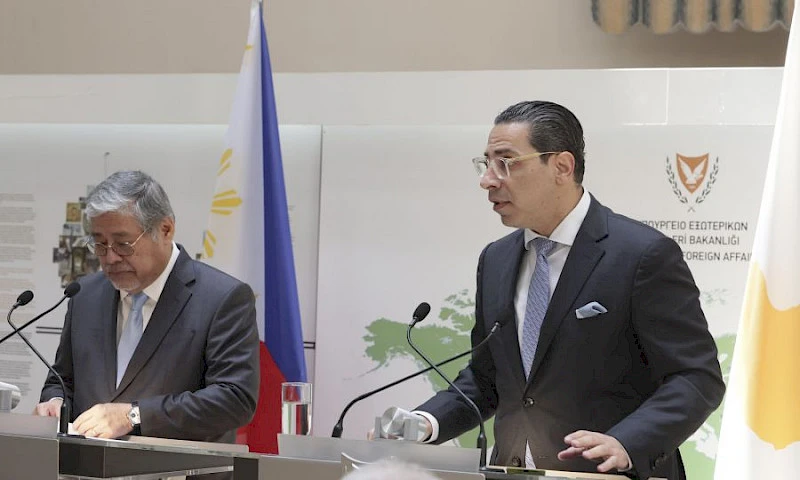How the Philippines' International Relations Affect Tourism and Business in Cyprus
International relations play a key role in shaping economic and tourism ties between countries. We explore these relations in the article on Cyprus-FAQ.
The Philippines, as a dynamically developing Asian country, maintains diplomatic and trade relations with various states, including Cyprus. These connections can indirectly, yet significantly, influence Cyprus' tourism appeal and business climate. In this article, we examine how the Philippines' interactions with other countries, including the EU, impact Cyprus' economy and tourism.

Diplomatic and Economic Ties Between the Philippines and Cyprus
Cyprus and the Philippines maintain official diplomatic relations that promote the development of trade, investments, and labor migration.
Trade Agreements
Although there are no large-scale direct trade deals between the two countries, Cyprus, as an EU member, participates in pan-European economic programs that may involve the Philippines.
The Republic of Cyprus, as a member of the European Union, conducts trade relations with the Philippines under the EU's common trade policy. Currently, cooperation is actively developing in the fields of goods and services trade, with particular attention to maritime transport. The tourism sector also plays a significant role, providing additional opportunities for interaction between the countries. Investment cooperation is also becoming an increasingly important aspect of bilateral relations.
The legal framework for trade relations between the Republic of Cyprus and the Philippines consists of several levels of regulation. First, there are general agreements within the WTO that create basic conditions for trade. Trade agreements between the EU and the Philippines, as well as bilateral memorandums of understanding detailing specific aspects of cooperation, also play an important role.
Investments
Philippine businesspeople view Cyprus as a potential financial hub due to its favorable tax policy.
The Republic of Cyprus, being a member of the European Union, offers attractive conditions for foreign investors, including a stable legal system, favorable taxation, and a developed financial infrastructure. The Philippines, in turn, has a dynamically developing economy and a large domestic market, creating favorable conditions for Cypriot investments.
Key sectors for mutual investments include financial services, real estate, tourism infrastructure, and the technology sector. Special interest is given to projects in renewable energy and the digital economy, where both countries demonstrate significant growth potential.
Investment activity is regulated by a set of international agreements, including treaties on investment protection and the avoidance of double taxation. Common investment mechanisms within the agreements between the EU and ASEAN countries also play a significant role.
Labor Migration
A significant number of Filipino workers live in Cyprus, particularly in the service, healthcare, and tourism sectors.
Filipino workers have traditionally been in demand on the Cypriot labor market, especially in the service, hospitality, and domestic sectors. Their high level of professional training, English language skills, and reputation as responsible workers make Filipinos attractive candidates for Cypriot employers.
Labor migration is regulated by a set of international and national legal norms. Cyprus, as an EU member, applies European standards for the protection of migrant workers' rights, while also considering the specifics of bilateral relations with the Philippines. Employment and social protection agreements play an important role in this context.
Labor migration is of significant importance to the economies of both countries. For the Philippines, it is a source of remittances and a way to reduce unemployment levels, while for Cyprus, it is a means of filling vacancies in certain sectors of the economy. Special attention is given to the protection of workers' rights, ensuring decent working conditions, access to healthcare, and pharmacies in Cyprus.
An important aspect of labor migration is the social adaptation of Filipino workers in Cyprus. This includes language training, familiarization with local culture and traditions, and creating conditions to maintain ties with fellow countrymen.
It is important to note that not many Filipinos are eager to come to Northern Cyprus. However, tourists do travel along this route, such as from Nicosia to Kyrenia.
These factors contribute to strengthening economic ties and create the prerequisites for the growth of mutual investments.

Impact on Cyprus' Tourism Sector
Tourism is one of the key sectors of Cyprus' economy, and international relations with the Philippines can impact it in several ways.
Tourist Flow from the Philippines to Cyprus
There are no direct flights between the Philippines and Cyprus, but strengthening ties may stimulate the interest of Filipino tourists in Europe, including Cyprus.
Cyprus can become an attractive destination for wealthy Filipinos looking for alternative resorts.
Cyprus attracts Filipino tourists with its unique characteristics: Mediterranean climate, rich historical heritage, well-developed tourist infrastructure, and high service standards. Special interest lies in beach holidays, historical landmarks, and opportunities for cultural tourism. Natural attractions, such as Lover's Bridge, are also noteworthy.
The development of tourist flows is facilitated by the simplification of visa procedures for Filipino citizens wishing to visit Cyprus. A key role is played by travel agencies in both countries, which develop special tourist programs and routes taking into account the interests and preferences of Filipino travelers.
The main flow of tourists from the Philippines occurs in the summer season when the weather conditions in Cyprus are most favorable for beach vacations. Cultural and educational tours, including visits to historical monuments, museums, and religious sites, are also popular.
Impact of Filipino Workers on the Hospitality Industry
Many hotels and restaurants in Cyprus employ Filipino staff, which enhances the quality of service and makes Cyprus more attractive to international tourists. Cultural exchange contributes to the diversity of tourist services.
Filipino workers are highly valued in the Cypriot hospitality industry due to a number of important characteristics: excellent command of English, natural friendliness, client orientation, and high professional training. Their ability to create a comfortable atmosphere for guests has become an important factor in the success of many hotels and restaurants. However, Filipinos are rarely found among taxi drivers on Cyprus.
The presence of Filipino workers has contributed to the improvement of service standards in Cyprus' hotel sector. Their attention to detail, hard work, and professional ethics have helped many establishments improve the quality of their services and receive positive reviews from international tourists.
Cooperation in Event and Conference Tourism
Strengthening business ties may lead to an increase in the number of business events with the participation of Filipino companies in Cyprus. The contribution of Filipino workers to the development of Cyprus' hospitality industry is of significant economic importance. Their professionalism helps maintain a high level of service during the peak tourist season, which positively impacts Cyprus' reputation as a tourist destination.
Impact on Cyprus' Business Environment
The Philippines, as a growing economy, can influence Cyprus' business climate through investments, labor resources, and partnership programs.
Financial Services and Offshore Business
Cyprus traditionally attracts foreign companies due to its low taxes. Filipino entrepreneurs may use Cypriot jurisdictions for tax optimization. Joint investment projects in real estate and tourism are possible.
Outsourcing and IT Cooperation
The Philippines is a world leader in outsourcing services. Cypriot companies can cooperate with Filipino IT specialists, which will reduce the cost of software development.
Migration of Skilled Workers
Filipino specialists in the fields of medicine, IT, and finance can replenish Cyprus' labor pool, enhancing its competitiveness.

Potential Challenges and Risks
Despite positive trends, there are potential issues:
- Geopolitical instability: Tension in the Asia-Pacific region may affect economic ties.
- Currency fluctuations: Changes in the exchange rates of the Philippine peso and the euro may impact investment attractiveness.
- Competition: Other countries (e.g., Malta, Greece) are also competing for Filipino investments and tourists.
International relations between the Philippines and Cyprus have a multifaceted impact on tourism and business in Cyprus. Strengthening diplomatic and economic ties contributes to the influx of investments, expansion of labor resources, and increased tourist appeal. However, to maximize benefits, potential risks must be considered, and bilateral cooperation should be actively developed.
In the future, enhanced partnership between the Philippines and Cyprus may open new opportunities for both countries in trade, tourism, and technological exchange.
